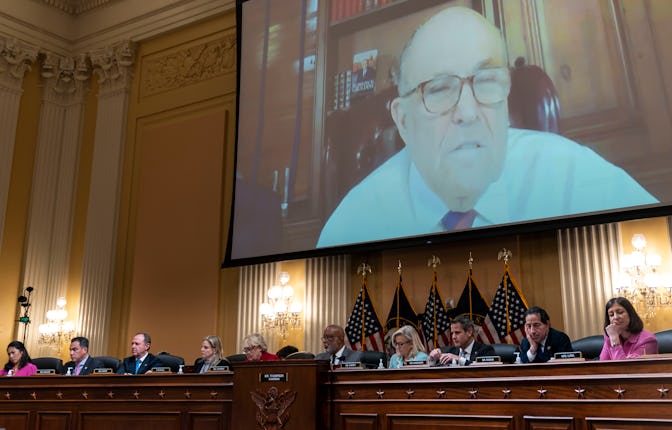These Jan. 6 committee hearings are a masterclass in ass-covering
It’s all about creating a compelling narrative, and Trump’s main enablers have finally landed on theirs: “It’s not our fault.”

Before this latest round of House Select Committee hearings into the Jan. 6 insurrection began, I argued that the goal of these televised events is less about dropping bombshell news updates and more about establishing an understandable narrative for the public to latch on to. Now, after several days of testimony, compelling video montages, and expert analysis, it seems as if the committee has largely done just that — eschewing “gotcha” moments in favor of methodically building a chronicle of just how Donald Trump and his enablers set the stage for, executed, and then capitalized on an attempted coup of their own making.
Throughout all this, however, a second narrative has emerged from the many, many conservative figures and former administration officials deposed as part of the committee’s investigation. Broadly, it can be described as: ass covering.
To work for — or even just be in general proximity to — the Trump administration has always been an exercise in blame-shifting and ex post facto claims of heroism. Nothing is ever your fault; you were the adult in the room, the norm protector, the person making sure things didn’t get even crazier than they already were. We’ve seen it again and again with any number of former Trump officials who, immediately after exiting the White House (whether voluntarily, or under Secret Service escort) started giving interviews, hawking memoirs, and leaking quotes of self-aggrandizement and reputational rehabilitation, from H.R. McMaster and Omarosa Manigault to Rex Tillerson, Gary Cohn, and Stephanie Grisham. But never has that reflex of ass-coverage been more nakedly on display than in the expertly handled deposition videos and testimony shared by the committee, as proof of Trump’s alleged criminality.
Consider the speed with which Jason Miller and Bill Stepien, two high-level Trump officials, were willing and eager to pinpoint Rudy Giuliani’s alleged inebriation as a factor in his push to convince the Trump to deny the results on election night in 2020. And consider as well that Miller seemingly still works for Trump, while Stepien continues to profit off the former president’s “big lie” denialism; clearly the pair isn’t troubled by the seditious effort to the point of fully extricating themselves from its originators and adherents. Yet the implication in their testimonials is clear: “We were the sane ones here, it was drunken Rudy who pushed this craziness!”
We see a similar process coalescing around former White House Chief of Staff Mark Meadows, whom former Vice President Mike Pence’s staff pinpointed as not only being one of the main hubs of insurrectionist agitation inside the White House, but as doing so knowing full well that the legal theory being used to justify that effort was (obviously) nonsense.
Same, too, with chief insurrectionist legal theorist John Eastman, who was repeatedly identified by numerous White House officials, campaign figures, and legal observers as the chief architect of Trump’s push to overturn the vote — all while they, the virtuous constitutional defenders, had told him it was all nonsense (something Eastman had even acknowledged in private).
A measure of finger-pointing in this case is to be expected. The Trump administration (and really, his entire philosophy of leadership) was predicated on pitting underlings against one another in a Thunderdome of personal and political favor. Similarly, in the sprawling churn of White House staffers, campaign officials, surrogates, and supporters, it’s understandable that there would be a Gordian knot of conflicting vectors and narratives as a byproduct of the sheer complexity of that dense ecosystem. And we should not lose sight of the fact that, yes, there are some people involved in the former president’s electoral conspiracy who do shoulder more blame than others.
On Tuesday, the committee is set to call as witnesses some of the election officials who were left to deal with the fallout of Trump and his cronies’ baseless claims of fraud. Star among them is Georgia Secretary of State Brad Raffensperger, whom Trump famously called and asked to “find” the 11,000-plus votes he would’ve needed to overcome Joe Biden’s lead and win the Peach State. As The Washington Post put it, it’s a spectacle “designed to highlight state and local officials who resisted pressure from Trump and those around him.”
But ask yourself this: Had the former president’s scheme to overturn his electoral loss been successful, and if we were, now, living under a second Trump administration, would these various witnesses and accomplices be so quick to shirk responsibility for their roles? If Trump had actually managed to overturn the 2020 election, and remained president, would Chief White House Adviser Jason Miller, or Secretary of State Rudy Giuliani, or Attorney General Bill Stepien actually try to distance themselves from the effort that brought them there? Of course not. They’d be doing the exact opposite, scrambling to take credit for the very thing they’re now working to downplay. The ongoing parade of ass-coverers is notable not for their courage, but for their skill in identifying and leveraging a deal gone bad.